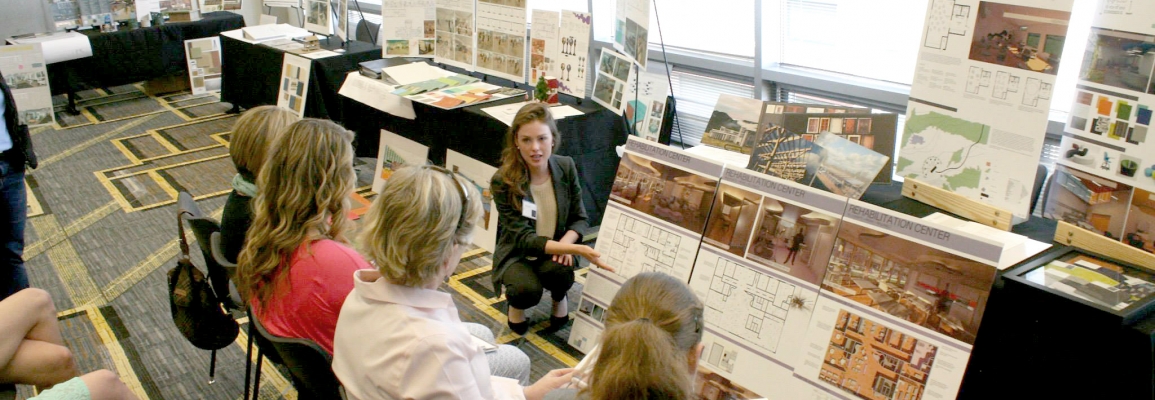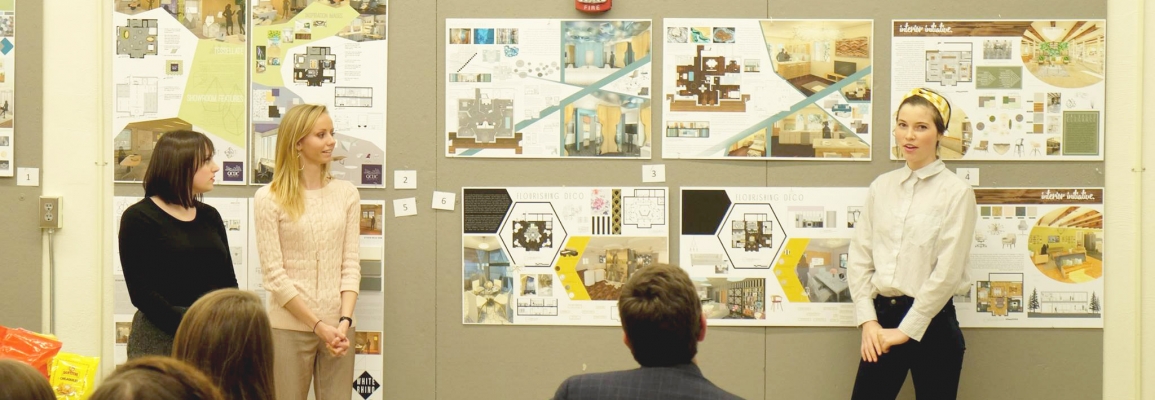Our Mission
The mission of the interior design program at Appalachian State University is to provide an educational foundation that prepares students to enter the interior design profession and positions the student to seek professional status through examination and qualification.
Our Philosophy
The interior design curriculum focuses on integrating theory and application through individual and collaborative problem-solving strategies within the context of the design process. The program places particular emphasis on community service, environmental responsibility, global issues, and universal design in order to prepare students for the challenges of the ever-changing profession. Through practical and aesthetically appropriate design solutions, students actively engage in the development of interior spaces from an ethically responsible perspective for the purpose of achieving increased productivity, improving the quality of life, and protecting the health, safety and welfare of the public. The program is dedicated to creating a supportive learning environment that allows students to develop individual expression of knowledge and skills to create resonance and connection with the practice of interior design.
The Interior Design program is committed to uphold the standards of the Council for Interior Design Accreditation (CIDA, formerly FIDER), and to prepare students to meet the educational qualifications of the National Council for Interior Design Qualifications (NCIDQ). Students and faculty are actively involved in professional organizations like the American Society of Interior Designers (ASID) and the International Interior Design Association (IIDA).
Our CIDA Accreditation
The interior design program leading to the Bachelor of Science in Interior Design is accredited by the Council for Interior Design Association, www.accredit-id.org, 206 Grandville Avenue, Suite 350, Grand Rapids, MI, 49503.
The CIDA-accredited program prepares students for entry-level interior design practice, for advanced study, and to apply for membership in professional interior design organizations. The Bachelor of Science in Interior Design granted by Appalachian State University meets the educational requirement for eligibility to sit for the National Council for Interior Design Qualification (NCIDQ Exam). For more information about NCIDQ Exam eligibility visit: https://www.cidq.org/eligibility-requirements
Our Institutional Accreditation
Appalachian State University is accredited by the Southern Association of Colleges and Schools Commission on Colleges to award baccalaureate, master’s, intermediate, and doctoral degrees.
Our Goals
The program desires to produce students who:
- seek professional interior design status
- are globally aware and culturally sensitive
- are environmentally conscious
- are aware that their skills can make a difference through design and that they can give back to the community through pro bono design services to non‐profit organizations and those in need
- possess a strong foundation in building science and the pragmatic knowledge of construction methods
- understand the multi‐disciplinary nature of our program and the relationship with allied disciplines
Our Student Learning Outcomes (SLO's)
The program supports program goals through the following SLO's:
- Think Critically:
- Students will employ the design process to achieve project resolution.
- Students will develop projects based on design elements and principles (including light and color).
- Students will produce visual and verbal communications in compliance with industry practices.
- Experiment Creatively:
- Students will formulate multiple responses to single problem statements.
- Students will practice construction processes and protocols.
- Students will appraise product and material selections.
- Students will experiment with light and color.
- Empathize Globally:
- Students will integrate human-centered design in their project development.
- Students will construct design solutions in a global context.
- Students will evaluate environmental systems responsive to cultural, economic, or geographic contexts.
- Understand Professional Practices:
- Students will recognize the value of integrated design practices and working in teams.
- Students will analyze historical precedents appropriate to project typologies.
- Students will apply professional regulations and guidelines.
- Students will demonstrate business practices and professionalism in oral, written, and graphic communications.
We encourage our students to:
- Push the boundaries
- Take risks
- Explore
- Experiment
- Be thoughtful designers
- Try something new
- Step outside boundaries of comfort
- Think outside their own experiences
- Grow, evolve, and continually change
- Consider meaning, context and history
- Be able to make informed design decisions
- Think critically
- Appropriately defend design decisions
- Be globally aware
- Be culturally sensitive
Why?
- To be prepared for all challenges
- To be responsible designers
- To be productive members of society
- To prepare for the future of the built environment
- To not just be an interior designer, but to be a designer
- To be open to life-long learning


